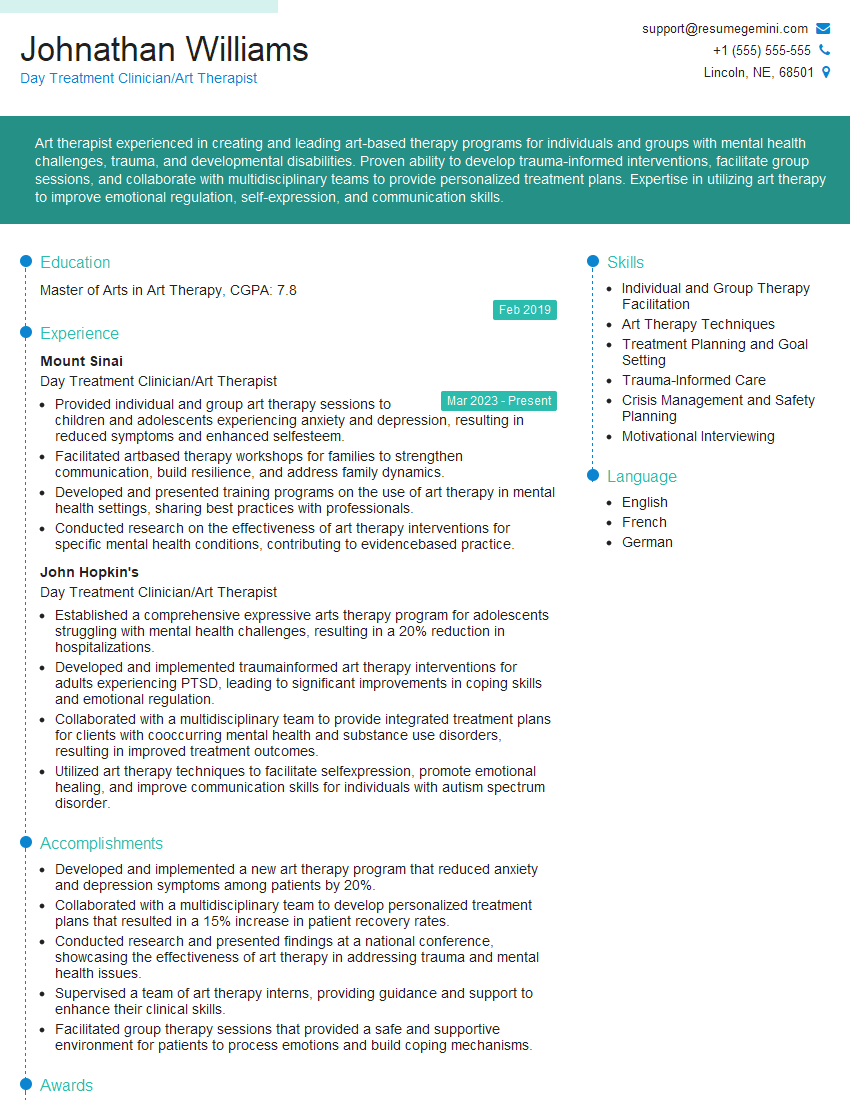Are you a seasoned Day Treatment Clinician/Art Therapist seeking a new career path? Discover our professionally built Day Treatment Clinician/Art Therapist Resume Template. This time-saving tool provides a solid foundation for your job search. Simply click “Edit Resume” to customize it with your unique experiences and achievements. Customize fonts and colors to match your personal style and increase your chances of landing your dream job. Explore more Resume Templates for additional options.

Johnathan Williams
Day Treatment Clinician/Art Therapist
Summary
Art therapist experienced in creating and leading art-based therapy programs for individuals and groups with mental health challenges, trauma, and developmental disabilities. Proven ability to develop trauma-informed interventions, facilitate group sessions, and collaborate with multidisciplinary teams to provide personalized treatment plans. Expertise in utilizing art therapy to improve emotional regulation, self-expression, and communication skills.
Education
Master of Arts in Art Therapy
February 2019
Skills
- Individual and Group Therapy Facilitation
- Art Therapy Techniques
- Treatment Planning and Goal Setting
- Trauma-Informed Care
- Crisis Management and Safety Planning
- Motivational Interviewing
Work Experience
Day Treatment Clinician/Art Therapist
- Provided individual and group art therapy sessions to children and adolescents experiencing anxiety and depression, resulting in reduced symptoms and enhanced selfesteem.
- Facilitated artbased therapy workshops for families to strengthen communication, build resilience, and address family dynamics.
- Developed and presented training programs on the use of art therapy in mental health settings, sharing best practices with professionals.
- Conducted research on the effectiveness of art therapy interventions for specific mental health conditions, contributing to evidencebased practice.
Day Treatment Clinician/Art Therapist
- Established a comprehensive expressive arts therapy program for adolescents struggling with mental health challenges, resulting in a 20% reduction in hospitalizations.
- Developed and implemented traumainformed art therapy interventions for adults experiencing PTSD, leading to significant improvements in coping skills and emotional regulation.
- Collaborated with a multidisciplinary team to provide integrated treatment plans for clients with cooccurring mental health and substance use disorders, resulting in improved treatment outcomes.
- Utilized art therapy techniques to facilitate selfexpression, promote emotional healing, and improve communication skills for individuals with autism spectrum disorder.
Accomplishments
- Developed and implemented a new art therapy program that reduced anxiety and depression symptoms among patients by 20%.
- Collaborated with a multidisciplinary team to develop personalized treatment plans that resulted in a 15% increase in patient recovery rates.
- Conducted research and presented findings at a national conference, showcasing the effectiveness of art therapy in addressing trauma and mental health issues.
- Supervised a team of art therapy interns, providing guidance and support to enhance their clinical skills.
- Facilitated group therapy sessions that provided a safe and supportive environment for patients to process emotions and build coping mechanisms.
Awards
- Received the Outstanding Clinician of the Year award for demonstrating exceptional clinical skills and dedication to patient care.
- Awarded the Art Therapist of Excellence for innovative use of art therapy interventions to enhance patient outcomes.
- Recognized with the Patient Advocacy Award for consistently going above and beyond to advocate for patients rights and wellbeing.
Certificates
- Registered Art Therapist (ATR)
- Licensed Professional Counselor (LPC)
- Licensed Clinical Social Worker (LCSW)
- Certified Trauma Professional (CCTP)
Career Expert Tips:
- Select the ideal resume template to showcase your professional experience effectively.
- Master the art of resume writing to highlight your unique qualifications and achievements.
- Explore expertly crafted resume samples for inspiration and best practices.
- Build your best resume for free this new year with ResumeGemini. Enjoy exclusive discounts on ATS optimized resume templates.
How To Write Resume For Day Treatment Clinician/Art Therapist
- Highlight your specialized skills in art therapy and the specific populations you have worked with.
- Showcase your experience in developing and implementing trauma-informed interventions and group therapy programs.
- Quantify your results whenever possible, providing specific examples of how your work has led to positive outcomes for clients.
- Include a section in your resume that demonstrates your research and writing skills.
- Obtain relevant certifications, such as the ATR-BC (Registered Art Therapist Board Certified) credential.
Essential Experience Highlights for a Strong Day Treatment Clinician/Art Therapist Resume
- Conduct individual and group art therapy sessions to assess, diagnose, and treat mental health conditions.
- Develop and implement expressive arts therapy programs tailored to specific populations, such as adolescents, adults with PTSD, and individuals with autism spectrum disorder.
- Collaborate with mental health professionals to develop integrated treatment plans that incorporate art therapy interventions.
- Lead and facilitate workshops and training programs on the use of art therapy in various settings.
- Conduct research to evaluate the effectiveness of art therapy interventions and contribute to evidence-based practice.
- Maintain accurate client records, document progress, and provide regular updates to healthcare team.
- Stay up-to-date with current trends and research in the field of art therapy.
Frequently Asked Questions (FAQ’s) For Day Treatment Clinician/Art Therapist
What is the role of an art therapist?
An art therapist uses art as a therapeutic tool to help individuals express themselves, explore their emotions, and develop coping mechanisms for mental health challenges.
What are the benefits of art therapy?
Art therapy can promote self-expression, emotional healing, improved communication skills, and reduced symptoms of mental health conditions such as anxiety and depression.
What types of mental health conditions can be treated with art therapy?
Art therapy can be effective in treating various mental health conditions, including anxiety, depression, trauma, PTSD, and autism spectrum disorder.
How does insurance cover art therapy?
Insurance coverage for art therapy varies depending on the insurance provider and plan. Some insurance plans may cover art therapy sessions if deemed medically necessary and provided by a qualified art therapist.
How do I find a qualified art therapist?
To find a qualified art therapist, you can consult online directories like the American Art Therapy Association’s website or ask for referrals from mental health professionals.